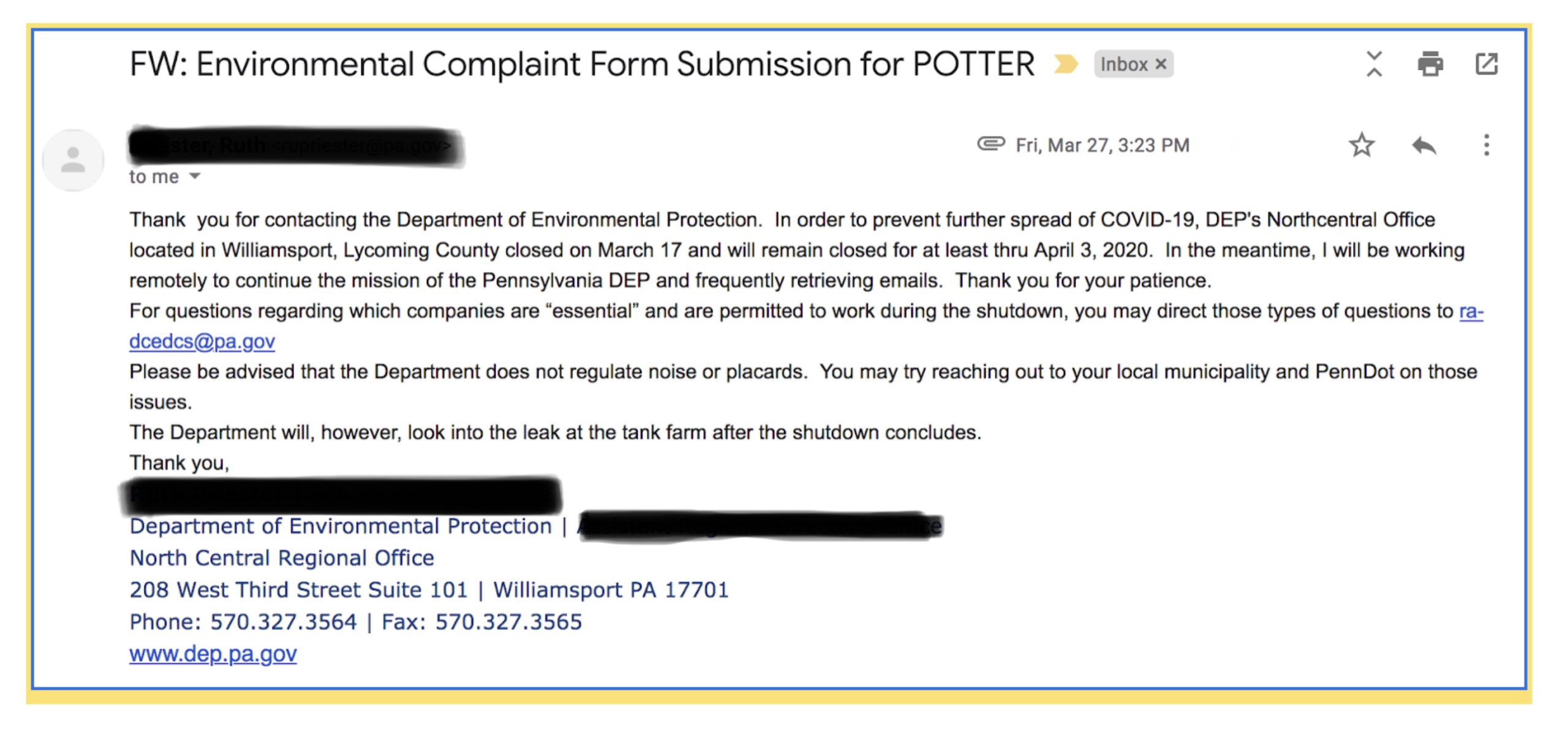This is a follow-up to a press release issued last week by Earthworks regarding a resident complaint and the PA DEP’s policy on investigations during COVID.
During a public health emergency, the government response to one crisis should not fuel another. That is why I was outraged when I was told by the Pennsylvania Department of Environmental Protection (DEP) that no one would investigate a complaint I filed–about a possible leak of oil and gas wastewater from a nearby facility, which could have the potential of impacting my family’s drinking water supply–until after the COVID state-wide “shutdown” was over.
My family is suffering sleep deprivation due to 24-hour wastewater truck traffic during an already stressful quarantine. My grandparents are in poor health, my parents have been laid off, and the fear of losing our water supplies due to a spill makes it all worse. Being told by DEP that they weren’t sending staff out here until after the shutdown was terrifying news, especially because the former leak at JKLM Energy’s nearby waste site is one of many, many pollution events in the company’s short history here in Potter County. Will the next leak be from a truck rollover like the one that happened on March 29th, spilling fracking waste into someone’s yard?
It wasn’t until Earthworks publicly questioned the DEP on its COVID enforcement policy, based on the email that DEP sent, and reporters began to probe the issue that a DEP spokesperson told a reporter that an investigation was underway.
It shouldn’t take a national environmental organization’s press release and the associated media attention for DEP to take action. Nor should a member of the public find out about the status of her complaint second-hand from a newspaper article rather than an email, a phone call, or a letter directly from the DEP.
Protecting the health and safety of all Pennsylvanians is the job of the DEP–it’s in the agency’s mission. And never has it been more important for DEP to protect residents from the harms of pollution–and to communicate that to residents–than right now.
Ever since Governor Tom Wolf has issued an indefinite stay at home order for the entire state, 1.5 million residents have been effectively trapped with the physical and emotional health threats of living next to industry. The threat from everyday oil and gas pollution is real, and now many families have nowhere to go if there’s a major problem with an operation.
During a public health crisis, state agencies need to be more responsive to residents, not less. Communicating directly with complainants is part of DEP’s job. As Earthworks has shown in past research and has sometimes experienced through its own complaint filing, DEP often falls short in this regard. And as I’ve reported over at Public Herald, scores of residents across the Commonwealth have also revealed to us and the Attorney General’s Office DEP’s poor response to their reports of drinking water contamination near oil and gas operations.
If oil and gas operations are deemed “essential” enough to continue, so too must all DEP activities that help keep residents safe.
According to a DEP spokesperson quoted in the PennLive article about my case, the agency has since adopted a COVID policy of “prioritizing field inspections of critical infrastructure and inspections that are critical to public health and safety.” What isn’t yet clear is the definition of “critical inspections.”
At a time like this, the health and safety of everyone everywhere should be considered critical– for both oil and gas workers and nearby residents.

